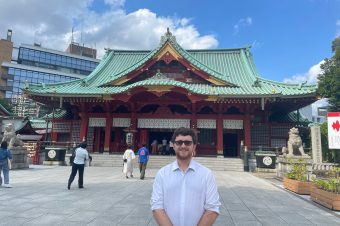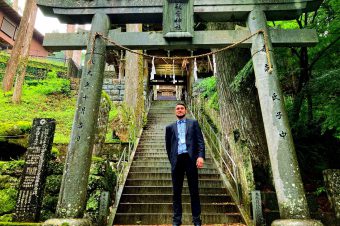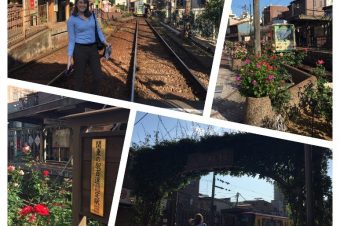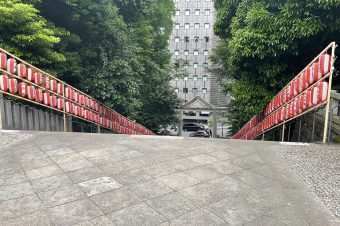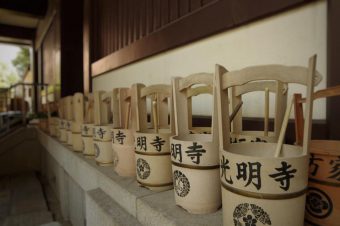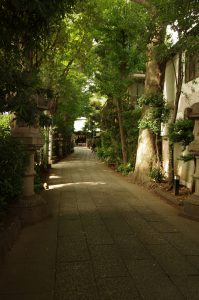 Togoshi Hachiman Shrine is located in Tokyo, Japan at the end of the Togoshiginza shopping street. There are a lot of attractive stores so there are always crowds of people, most likely locals. Every store has a unique personality and the atmosphere of the street is absolutely amazing. The most fascinating store, in our opinion, was an onigiri (rice balls) store. When we visited, we wanted to try some, but they were sold out. We have decided that next time we will come early in order to beat the crowds. At the end of this amazing street, we found the Togoshi Hachiman Shrine. The shrine sits in a quiet neighborhood and safe city so local children played cheerfully at the grounds near the shrine.
Togoshi Hachiman Shrine is located in Tokyo, Japan at the end of the Togoshiginza shopping street. There are a lot of attractive stores so there are always crowds of people, most likely locals. Every store has a unique personality and the atmosphere of the street is absolutely amazing. The most fascinating store, in our opinion, was an onigiri (rice balls) store. When we visited, we wanted to try some, but they were sold out. We have decided that next time we will come early in order to beat the crowds. At the end of this amazing street, we found the Togoshi Hachiman Shrine. The shrine sits in a quiet neighborhood and safe city so local children played cheerfully at the grounds near the shrine.
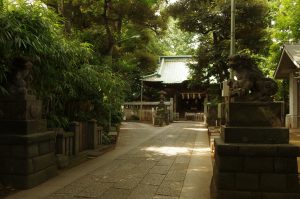 The shrine is surrounded by nature and the path leading up to the shrine, called Sando, is neatly maintained and very beautiful. When we visited the shrine, there was sunshine filtering through the branches of the dozens of trees, which surrounded the shrine. The awe-inspiring beauty of the shrine helped us understand why this place is considered sacred and holy. We purified both our mind and body at the temizuya and headed to the Honden (main hall). In front of the Honden, there are two Komainu (guardian lion-dogs, read about them here:]http://sanpai-japan.com/2016/07/11/what-are-koma-inu/), which are the oldest in the Shinagawa district and are registered as tangible important cultural properties of the Shinagawa district. After we worshipped, we found lots of ema to the side of the Honden. Ema is dedicated to the shrines and temples as a sign/proof of the gratefulness and wishes of people who visit the shrine. In addition, it is a precious script to learn the knowledge of people and about folk religion. Learn more about ema here: http://sanpai-japan.com/2016/06/24/what-are-omikuji-and-ema/
The shrine is surrounded by nature and the path leading up to the shrine, called Sando, is neatly maintained and very beautiful. When we visited the shrine, there was sunshine filtering through the branches of the dozens of trees, which surrounded the shrine. The awe-inspiring beauty of the shrine helped us understand why this place is considered sacred and holy. We purified both our mind and body at the temizuya and headed to the Honden (main hall). In front of the Honden, there are two Komainu (guardian lion-dogs, read about them here:]http://sanpai-japan.com/2016/07/11/what-are-koma-inu/), which are the oldest in the Shinagawa district and are registered as tangible important cultural properties of the Shinagawa district. After we worshipped, we found lots of ema to the side of the Honden. Ema is dedicated to the shrines and temples as a sign/proof of the gratefulness and wishes of people who visit the shrine. In addition, it is a precious script to learn the knowledge of people and about folk religion. Learn more about ema here: http://sanpai-japan.com/2016/06/24/what-are-omikuji-and-ema/
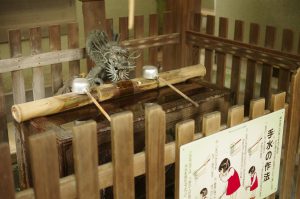 The origin of this shrine is that a man discovered a sacred object at a pond. He enshrined it and invited the kami Hondawake no Mikoto as an enshrined deity, which is now the kami of Togoshi Hachiman Shrine. The Honden was made of wood, and it is a precious and rare building because it survived the war and several earthquakes for a long time. In just nine years, this shrine will become 500 years old. When it reaches this milestone, preservation and maintenance will be started on the shrine.
The origin of this shrine is that a man discovered a sacred object at a pond. He enshrined it and invited the kami Hondawake no Mikoto as an enshrined deity, which is now the kami of Togoshi Hachiman Shrine. The Honden was made of wood, and it is a precious and rare building because it survived the war and several earthquakes for a long time. In just nine years, this shrine will become 500 years old. When it reaches this milestone, preservation and maintenance will be started on the shrine.
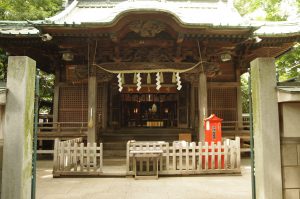 We then stopped by the Juyosho (a place to purchase talismans, charms, brochures, and other articles related to the Shinto shrine) where we could talk with chief priest and worker. They told us an interesting story. They said that they serve Japanese tea and Japanese sweet snacks to all worshippers whom stop by the Juyosho. On this hot day, it was an amazing time to drink cold tea and eat sweet food while sitting under the shade of the trees.
We then stopped by the Juyosho (a place to purchase talismans, charms, brochures, and other articles related to the Shinto shrine) where we could talk with chief priest and worker. They told us an interesting story. They said that they serve Japanese tea and Japanese sweet snacks to all worshippers whom stop by the Juyosho. On this hot day, it was an amazing time to drink cold tea and eat sweet food while sitting under the shade of the trees.
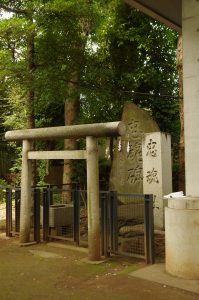 If you want to relax because of the chaos of the big city, the Togoshi Hachiman Shrine is a really nice place to visit. How about worshipping at this shrine and refreshing your mind?
If you want to relax because of the chaos of the big city, the Togoshi Hachiman Shrine is a really nice place to visit. How about worshipping at this shrine and refreshing your mind?
| Name | Togoshi Hachiman shrine |
|---|---|
| Japanese name | 戸越八幡神社 |
| Kami( ?) | Hondawakenomikoto |
| Address | 2-6-23 Togoshi Shinagawaku Tokyo |
| Direction | The Tokyu Oimachi line at Togoshi koen station |
| Price | |
| Hours | |
| Event | |
| Goshuin(?) | |
| Website | http://www1.cts.ne.jp/~hachiman/ |
| Other |
